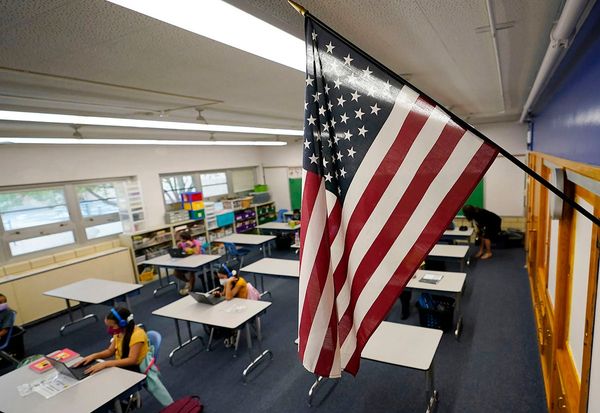
Earlier this week, 100-odd energy companies sent a letter warning the prime minister that his lack of new climate policies will threaten their profit margins. Then, the Cop26 president, Alok Sharma, announced a new attempt to end the de-facto ban on onshore wind energy in England, and Liz Truss backed him.
Neither of these calls made a huge splash in the news, because big business and rightwingers calling for green policy is no longer news. Instead, this is what normal looks like when capitalism starts to go green.
The response from the left is often dismissive: social democrats warn that citizens won’t let governments push through climate policy unless it’s redistributive – a so-called just transition – while socialists have a long list of reasons why, despite some concessions, capital ultimately won’t give up its carbon addiction. Both insist that if we are going to avoid climate catastrophe, we need an enormous transfer of wealth from the richest in society to everyone else, as well as a transition from fossil fuels to clean energy. That’s the green new deal.
But the widespread fear that political leaders will do nothing to stop global heating isn’t proving true. The energy transition is accelerating, with one influential report this month arguing that the Cop28 goal to triple renewables capacity by 2030 is within reach. The idea that capitalism can’t stop the climate crisis no longer looks certain.
But now we face a new problem: the climate action that’s happening is unmistakably inequitable. Thanks to the Inflation Reduction Act’s extension of tax credits, US taxpayers are effectively subsidising the dividends of clean energy’s wealthy investors. China’s solar energy miracle is bound up with economic growth and a political system that are both brutally unequal. The EU’s clean energy deal is ambitious but shifts some of the costs to poorer households. And these inequalities are both a reason that green finance is potentially lucrative and why it’s expanding so rapidly.
So we’re going green, but we’re not getting a new deal.
This is a huge missed opportunity. Because, while conservatives like Zac Goldsmith often claim that the market is facilitating this transition, it’s really the state that’s doing the heavy lifting. Around the world, governments have taken on the financial risk of the transition and are often funding it as well. But too often they refuse to leverage this. They don’t demand, say, that new green jobs are unionised, or mandate a reasonable ratio between the pay of workers and bosses. This is where the left must focus, with a relentless demand for better jobs, higher wages, lower consumer prices and maximum fairness.

If we lose that argument for equality, then so much is at risk. I think about the small town in Lebanon where I lived and worked in the late 2000s. On arriving, I was struck by how many car mechanics there were, but I quickly realised that wasn’t really so surprising. If public transport is always a bus, commercial haulage is always a lorry and individuals generally get around in shared taxis or on mopeds, then on many streets every other shop front is going to be a mechanic. It’s the same across most middle-income countries – and also parts of the US.
Picture the people who work in those garages. Picture their dependants and their suppliers. If the energy transition happens without historically unprecedented levels of economic redistribution – which is not what we’ll get if we carry on sliding into green state capitalism – then those people’s incomes will be devastated. Electric vehicles rely heavily on computers and new battery technology, so any significant repair job means a trip not to a local mechanic that’s run by your neighbours but to a corporate garage that’s staffed by digital experts.
Faced with the prospect of a deeply unequal energy transition, some people will feel relief: at least it would mean humanity escaping climate catastrophe. But consider the disruption that those car mechanics will experience, and imagine it affecting sector after sector, across the world and over a period of just three decades or so. The appalling levels of unemployment it would unleash, the macroeconomic impact that would have and the terrible upheaval it would trigger.
The backlash will be long, but its main consequence won’t be coalmines or carbon-intensive plants reopening. That’s too expensive. Instead, governments will send in the troops. Think of Kazakhstan last year. After fuel price controls were abolished there was massive popular unrest and the prime minister was removed. But Russian troops propped up the regime – and in the long term the price controls were abolished.
We have been warned about an “eco-fascist” future of murderous borders intended to repel the projected 1 billion climate refugees – and those border policies are well under way. But we also need to sound the alarm about a different looming disaster: governments using violence to impose mitigation measures that create profit for some and misery for the rest. You could call it eco-authoritarianism.
The good news is that we already have a solution. After all, there existed for much of the 20th century capitalist societies whose interventionist governments led rapid economic change, and which had strong trade unions, generous welfare states and robust political participation. They were called social democracies.
We previously wondered how governments could solve the climate crisis, and now we also have to ask how they can achieve that without creating new problems. So the question has changed, but the answer is the same: we need a green new deal.
Richard Power Sayeed is the author of 1997: The Future that Never Happened, a history of New Labour and Britain in the 1990s







